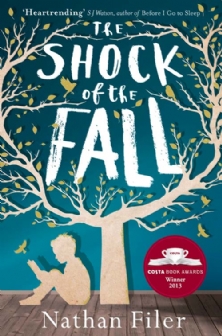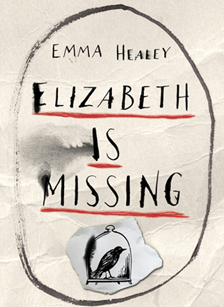All in the mind
by Daniel Lipscombe “O, that way madness lies; let me shun that;
“O, that way madness lies; let me shun that;
No more of that.”
King Lear
As the dust settles on Nathan Filer’s Costa Book Awards win for The Shock of the Fall (The Borough Press), a frank account of schizophrenia and grief from a man who has worked as a mental health nurse, there are plenty of new books to consider that offer insights into different aspects of mental illness.
Many writers in the past have attempted to tell of such troubles, often based on personal experience. Sylvia Plath springs immediately to mind with her account of depression in The Bell Jar, and other modern classics have depicted similar conditions, braving these topics well before society began to fully appreciate their impacts and challenges. Catcher in the Rye, One Flew Over the Cuckoo’s Nest and Catch-22 each dealt with personal and institutional mental health issues in a startlingly original way. It is a tradition that appears in fits and starts over literary history, and 2014 sees a bumper crop of books that centre on these issues. Here is our pick of those to go unshunned.
January saw the release of We Used to be Kings by Stewart Foster (Jonathan Cape), which chronicles schizophrenia in a young man after the death of his brother. In this dazzlingly intense and engaging book we read both voices in Tom’s head, and flit between dialogue and narration at a manic pace. Manic and surreal are words that can be used to describe Zoe Pilger’s debut Eat My Heart Out (Serpent’s Tail). While Zoe doesn’t confirm that her anti-heroine suffers from depression and delusions, this soon becomes clear. Attracting comparisons to Martin Amis, Nancy Mitford and Margaret Atwood, this a novel not to be missed. Away from fiction, Scott Stossel’s My Age of Anxiety (William Heinemann) is a frank and memorable account of the author’s ongoing battle with the only recently classified psychological condition, and the often outlandish treatments developed to counter it through the ages. Barbara Taylor’s The Last Asylum: A Memoir of Madness in Our Times (Hamish Hamilton, February) goes still deeper into the failings of Britain’s mental health system, as well as documenting her own eventual triumph over severe emotional illness.
 Other February releases include Naomi Wood’s second novel Mrs Hemingway (Picador), which focuses on Ernest Hemingway’s four wives and takes time to look at how mental illness degraded and stole away one of history’s greatest writers. Many believe that the stigma of mental health can be broken by honesty, particularly from celebrities. Ruby Wax’s paperback of Sane New World (Hodder) is a step in the right direction as the comedian tells of her struggles with depression and discusses how to handle the lows in everyday life.
Other February releases include Naomi Wood’s second novel Mrs Hemingway (Picador), which focuses on Ernest Hemingway’s four wives and takes time to look at how mental illness degraded and stole away one of history’s greatest writers. Many believe that the stigma of mental health can be broken by honesty, particularly from celebrities. Ruby Wax’s paperback of Sane New World (Hodder) is a step in the right direction as the comedian tells of her struggles with depression and discusses how to handle the lows in everyday life.
New paperbacks for April include Matt Haig’s hilarious and inventive The Humans (Canongate). Matt has suffered for many years from depression and his dark observations really put our species under the microscope. Debut author Rebecca Wait takes on depression and suicide in The View on the Way Down (Picador), a family tale of secrets and disturbing thoughts and a great insight into a fragile mind. Be Safe I Love You by Cara Hoffman (Virago) depicts the life of a female soldier returning from duty in Iraq with PTSD. This topical novel is inspired by her own brother who was a soldier for much of her young life. Another non-fiction entry to mix science with memoir is The Man Who Couldn’t Stop by David Adam (Picador), which tells the author’s unflinching story of dealing with OCD and will open the eyes of many who believe the disorder is only about organisation and cleaning.
 In June, Emma Healey’s much heralded Elizabeth is Missing (Viking) combines a suspenseful mystery with a protagonist suffering from dementia as she searches for a friend. Healey’s writing is already seeing a lot of early buzz on social media platforms. Schizophrenia is tackled again in Stuart Campbell’s John McPake and the Sea Beggars (Sandstone Press), in which the protagonist’s inner voices bitch and jostle to tell his story, obscuring his quest to be reunited with his lost brother. Then in July Sarah Rayner’s Another Night, Another Day (Picador) collects a small cast of characters, all under duress from life, as they begin to open their hearts within a clinic to support them in their depression.
In June, Emma Healey’s much heralded Elizabeth is Missing (Viking) combines a suspenseful mystery with a protagonist suffering from dementia as she searches for a friend. Healey’s writing is already seeing a lot of early buzz on social media platforms. Schizophrenia is tackled again in Stuart Campbell’s John McPake and the Sea Beggars (Sandstone Press), in which the protagonist’s inner voices bitch and jostle to tell his story, obscuring his quest to be reunited with his lost brother. Then in July Sarah Rayner’s Another Night, Another Day (Picador) collects a small cast of characters, all under duress from life, as they begin to open their hearts within a clinic to support them in their depression.
In the wake of so many sensitive and provocative tales of mental illness it is to be hoped sufferers will feel greater freedom to express their concerns, thoughts and needs as non-sufferers become more enlightened about these constricting disorders.
Daniel Lipscombe is a freelance writer and event programmer/social media strategist for Essex Book Festival 2014. He blogs and tweets as Utter Biblio.
utterbiblio.wordpress.com
@utterbiblio

